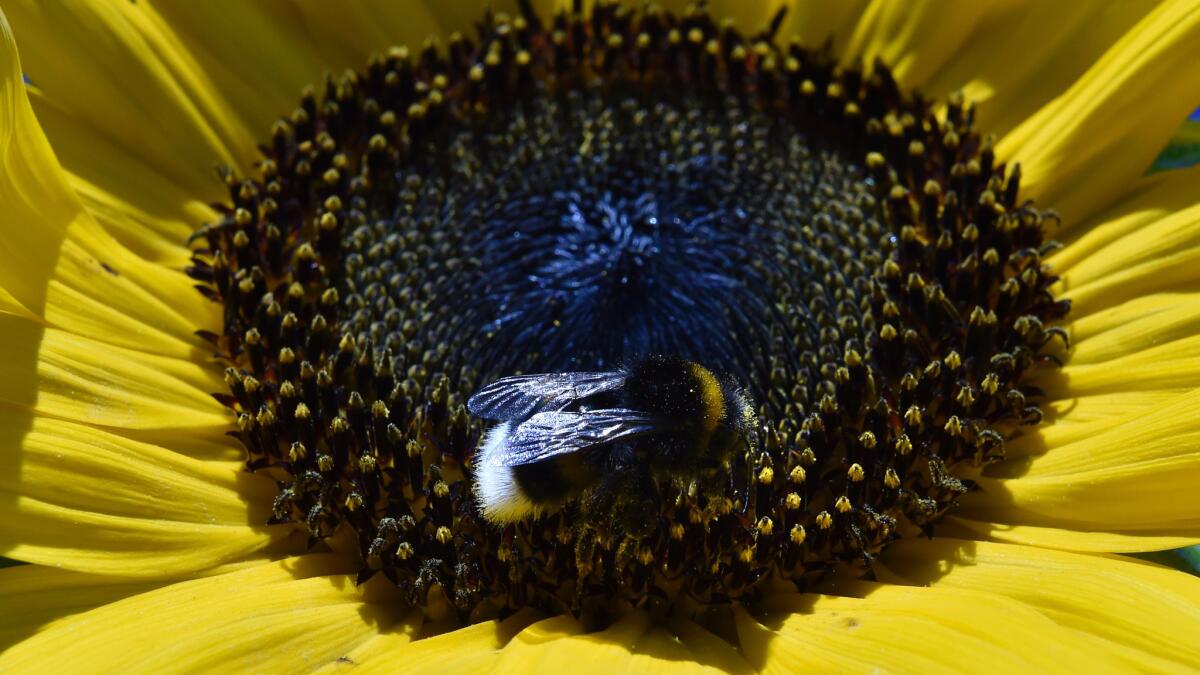Bees buzzing on sugar can experience emotions like happiness and optimism, scientists say

- Share via
Everyone knows sugar makes us feel good.
Studies have shown that sweet foods can improve adult humans’ moods and reduce crying and grimacing in babies when they are poked in the foot by researchers. But does it work on insects?
Researchers at Queen Mary University of London wanted to see whether they could induce happy feelings in fuzzy bumblebees to find out if invertebrates are capable of basic forms of emotion, or even emotion-like states.
With experiments involving humans (at least those above a certain age), scientists can simply ask their research subjects to report how they’re feeling. But when an animal is involved, scientists must infer the critter’s emotional state by observing its behavior.
So Clint Perry and colleagues fed bumblebees a sip of sugar water to test how the positive reward might bias the insects’ decision-making or affect their response to an attack by a predator. In their experiments, the sugared-up bees showed an emotion-like state similar to optimism, according a new study in Science.
In one experiment, the bees were placed in an enclosed foraging arena. They learned that a green card on the left side of the box meant there was a tasty drop of sucrose solution waiting for them inside a feeding cylinder. The bees then learned to associate a blue card on the right side of the arena with a less-exciting drop of plain water in the cylinder.
Then the researchers confounded their tiny subjects by placing a blue-green card at the center of the area. How would the insects interpret this situation that wasn’t sure to promise a reward at the end?
The bees with the sugar buzz appeared more likely to hope for the best — a sugary treat inside the cylinder — and they flew faster toward the ambiguous blue-green card than the insects that received no reward beforehand, the research team reported.
This suggests the bumblebees that were induced into a good mood showed a more optimistic response to the uncertain situation. (In a 2011 study, researchers showed that agitated honeybees predict a punishment will result from an ambiguous cue — an emotion similar to pessimism.)
The bumblebees’ response was consistent with how humans might behave.
“Happy people are more likely than unhappy people to make optimistic judgments about ambiguous situations,” Michael Mendl and Elizabeth Paul, two animal cognition researchers at the University of Bristol’s School of Veterinary Sciences, wrote in a commentary accompanying the study.
“Happy” bees also recovered more quickly after a simulated predator attack.
In the wild, bumblebees land on flowers to find nectar and pollen — where an opportunistic crab spider might be lying in wait. Sometimes the bees survive the ambush, giving them a chance to change their future behavior and avoid another attack.
Back in the lab, the researchers used a special feeder that would clamp down on the bumblebees for a few seconds before safely releasing them. The bees emboldened by sugar took less time to resume their business of foraging after the attack.
The bees’ behavior meet a number of criteria that satisfy scientists’ definition of emotion — in mammals or invertebrates.
For example, the study authors wrote, the bees’ sugar-induced mood persisted across different situations, both the mundane foraging task and the startling predator attack. The bees’ emotion-like states also were controlled by the same neurological circuitry as mammals.
Dopamine, the chemical that processes rewards in the human brain, appears to play a similar role in the insect brain.
See the most-read stories in Science this hour »
The researchers gave the bumblebees a dopamine inhibitor and repeated both the foraging and predator experiments. The results were striking: When the reward pathways in the bees’ brains were blocked, they did not show any of the feel-good effects of the sugar.
“The fundamental elements of emotion exist in many species,” the study authors concluded. “Our results lend support to the notion that invertebrates have states that fit the criteria defining emotion.”
However, whether the insects consciously experience “emotional feelings” remains unanswered, Mendl and Paul wrote.
“It is possible that some species subjectively experience emotion whereas others exhibit behavioral and physiological indicators of emotion (‘emotion-like’) without any accompanying feeling,” they wrote.
“But the possibility of insect consciousness is now the topic of exciting new theories and vigorous debate.”
Follow me on Twitter seangreene89 and “like” Los Angeles Times Science on Facebook.
MORE SCIENCE NEWS
For patients who need bone grafts, a 3D-printer could come to the rescue
How science would fare under a Clinton or Trump administration
It’s official: Rosetta’s long journey with comet 67P has ended







